SUMMARY
This is AI generated summarization, which may have errors. For context, always refer to the full article.
![[Only IN Hollywood] After a thousand cuts, and so it begins for Ramona Diaz and Maria Ressa](https://www.rappler.com/tachyon/2024/02/Leni-18.jpg)
LOS ANGELES, USA – “I’ve been coming a lot since 2004. But it is my fourth invitation to (screen a) film at the festival,” filmmaker Ramona Daz said at the beginning of my video interview with her and Maria Ressa about their second documentary collaboration, And So It Begins.
Both were calling from Sundance where And So It Begins was an official entry in the Robert Redford-founded film festival celebrating its 40th anniversary this year.
In 2004, Ramon Diaz, her fellow filmmakers – Joanna Vasquez Arong, Marty Syjuco, and Michael Collins – and I were Sundance newbies. These filmmakers have gone on to receive acclaim and awards for their respective documentaries.
It’s Maria’s second time at Sundance, following her and Ramona’s first doc, A Thousand Cuts, in 2020.
In her latest Sundance Film Festival participation since Imelda in 2004, Ramona presented And So It Begins, described as “a companion piece to her 2020 film, A Thousand Cuts. This film documents the hope and fight for democracy in the Philippines’ post-truth media age.”
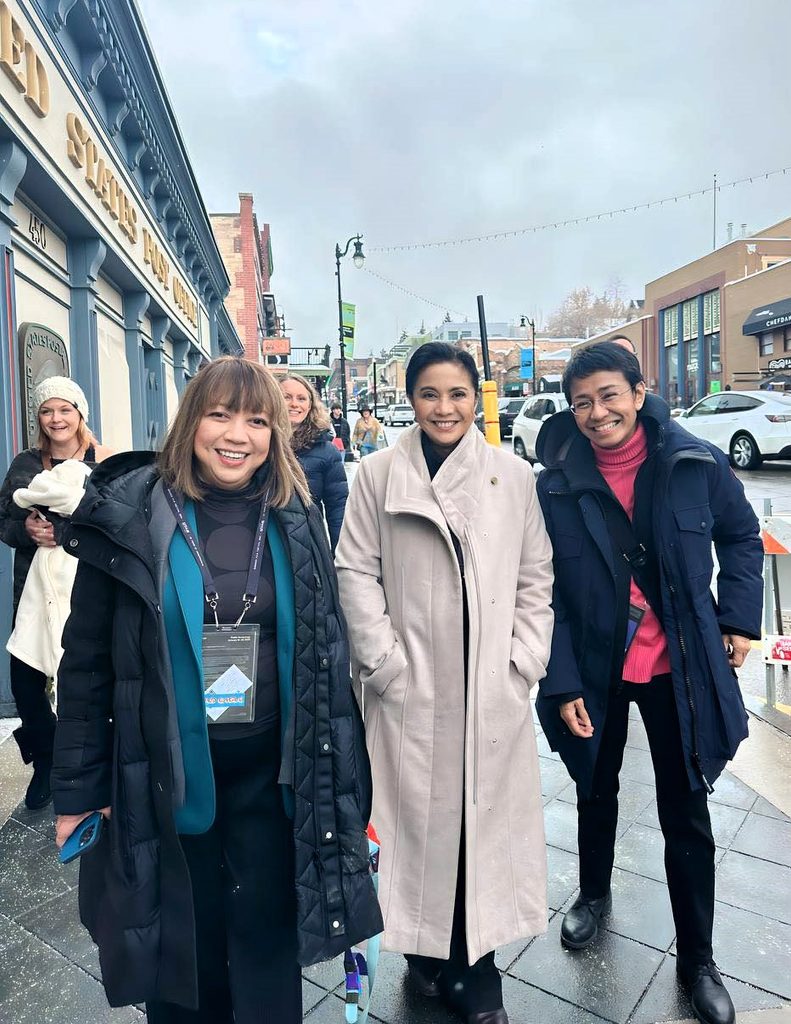
And So It Begins follows Leni Robredo as she campaigns in the 2022 Philippine elections and, as an effective parallel, also films Rappler CEO and cofounder Maria Ressa as she and the online news website fight disinformation and harassment.
Among the documentary’s favorable reviews is this one by Business Doc Europe’s Mark Adams who wrote: “What And So It Begins offers…is a fascinating and vibrant delve into politics in motion at a vital time within a country’s history, while at the same time making it clear how important it is to have honest and open journalism as a counterbalance to the dangers of falsified histories, fake news and misinformation.”
Jeff Nelson Guy, in his review for At The Movies, penned, “Diaz situates the documentary in many of Robredo’s lively and pink-covered rallies, where positive energy flows between here passionate supporters and volunteers, who see a better future for their country in Robredo.”

“Ressa is the second piece to And So It Begins, which is where the majority of the documentary’s commentary comes into play, discussing government corruption and interference in honest reporting in favor of Marcos-favored propaganda. It’s strikingly compelling, particularly when the film allows Ressa and other Rappler reporters the opportunity to discuss how dishonest and volatile politics impact their field.”
Below are excerpts from my interview with Ramona and Maria, who called from separate locations while attending the fest up in the snowy mountains in Park City, Utah. The interview was edited for brevity and clarity.
![[Only IN Hollywood] After a thousand cuts, and so it begins for Ramona Diaz and Maria Ressa](https://img.youtube.com/vi/J0KnVnczsYA/sddefault.jpg)
Congratulations, Ramona. Can you talk about And So It Begins in the context of having done previous documentaries on the Philippines and politics, especially from Spirits Rising, Imelda, A Thousand Cuts to this one? How has documenting these different periods in the Philippines shaped your perspective on the Philippines?
Ramona: I make these films because most of the year I live in the US and I make films about the Philippines as a yearning for the motherland every time. And a way to truly understand it more.
And as my understanding of the country shifted, it has become deeper and more nuanced in the process of making these films. It’s a great way to make documentary films about the motherland.
Because I live in this liminal space between the US and the Philippines. So, I’m always an observer in a way, neither here nor there and that’s a great way to be as a documentary filmmaker.
Maria, this is your second time to be followed by Ramona and her camera crew. How have you adjusted to a camera pointing at your face, especially when you are at work or writing?
Maria: At the beginning with A Thousand Cuts, part of the reason I said yes to Ramona, even though she turned me down for an interview when she was doing Imelda. When she asked me whether she could follow, I was like, so why did you turn down an interview with CNN?
Ramona: Can you imagine she remembered 14 years later? I cannot believe it. I thought she’d never remember because it’s a lifetime. How many lifetimes have we had? 14 years. She remembered.
Maria: Oh my god. But part of it, Ruben, was it was necessary. I felt like we didn’t know what was going to happen during the Duterte years. And we were constantly in quicksand.
I would have had to put a source if I wanted to document what we were going through because I’d never lived through anything like this. That would’ve been 35 years of being a journalist. Now it’s like 39, I guess, but it was safer for us.
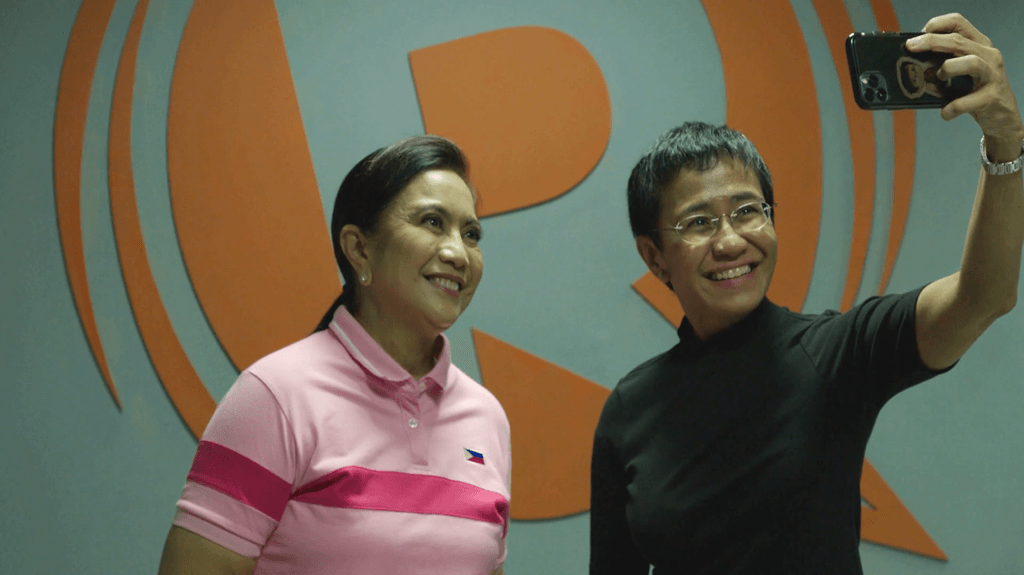
Not only did I want the record for posterity but – and thank you for reminding me, Ramona – for the next book, I might want to borrow some transcripts. There were some horrific moments where having a camera there, having Ramona there was a lifeline.
Like, we were going to push forward. When things got better, and things have gotten better for Rappler, it was, I guess we all got so used to each other. But we also got to know each other really well.
So, at the panel here in Sundance, I brought coffee onstage with us because I was jetlagging. And as I was talking, I knew Ramona was going to take my coffee because she was afraid it was going to fall. I just knew it.
So, that was part of it. But we’re living through moments that need to be documented. And frankly, I didn’t care what the final film was like, although I do care (laughs). Look at her looking.
Ramona: You do care.
Maria: Documentation was a big part of it. And then later on, we adjusted, right?
Because we ask this from people, from other people we cover. And to give this required trust for A Thousand Cuts. But over time, it just becomes easier.
Ramona: And I appreciate Maria being a true journalist because she understands the autonomy of a story. That I have to be autonomous in telling her story because that comes from journalism.
So, I appreciate that. It’s easier with journalists than anyone else because they understand that the story and authorship are sacrosanct.
Ramona, what was it like to follow Maria around again, and also how cooperative was Leni in granting you and your crew access to film her?
Ramona: It was difficult this time around because it was COVID. It was really health first. Everyone had to remain healthy. My crew had to remain healthy.
We had to have really strict protocols in place. We were only shut down once. The first time we were going to travel with VP Leni, we got shut down because my production driver got COVID.
But ever since then, I had wonderful field producers and our protocols were so strict. I housed everyone. So, we were in a bubble but really not because we were going out and filming people.
And we had to be careful like when we went to Maria’s apartment, everyone had been tested. It was an interesting time. But of course, as we filmed in 2022, then the world opened up again and it was easier to film.
It was always a question of whether we were going to be able to do it because you can’t get shut down every time. The budget can’t handle that. But thank God we were only shut down once.
The raid of Rappler’s office was intense to watch. Ramona, did you know it was just a practice drill? And Maria, how was that experience even though you probably knew it was just a drill?
Ramona: It was a drill so we were allowed to film it as a drill. I had been wanting to because those are the protocols that Rappler has to go through. It’s a drill; they have to do it.
And to me, it’s a crazy thing that they even have to do it. It’s insane that you have to do it. I had wanted to do it for A Thousand Cuts but never got a chance. It never happened.
So, I said, oh, this time around, it better happen. So, I think we had already wrapped and we were shooting Maria at Toms River (High School North, Maria’s alma mater). I came back to the Philippines just to film that (practice drill).
I was also doing other things but we had already basically wrapped principal photography and that was a pickup shoot. That, to me, was important because it’s a Kafkaesque moment. Why are you having to do this? It’s insane.
Maria: For us it was, and I actually pushed this, it’s a workflow. And we have a list; we separated different groups. You know some of this, Ruben, but when you’re there in the (Rappler) headquarters, if they come in, you have to know what are your rights with your phone, what do you do with your laptop.
I think what’s sad, where I get slightly nervous is when our younger kids, when our staff get emotionally affected. We talk about this and part of the reason, I think starting in 2016 when we were getting attacked on social media, we started offering counseling to our staff, our kids.
The median age in Rappler is 23 years old. Every time we do this, someone always breaks down. But for me, we need to. And we’re still not out of the woods, we could still get shut down.
So we’re still preparing for this. We want to make sure that we’re prepared because when it happens, if it happens, we have plan B, plan C, plan D, and that’s the only way you can operate if you want to be independent.
Ramona, having personally seen and filmed these huge crowds showing up for Leni in her rallies, what was your gut feeling going into the 2022 elections?
Ramona: I’m both a hopeful person but also realistic. I saw the numbers but when you are in the midst of those crowds, you start believing that there might be a chance that Leni will pull it off.
And I let myself believe it. That she could, against all odds, pull off this victory. And that’s why it was more heartbreaking when she didn’t.
It’s hard not to believe, right? Because when you’re surrounded by all that excitement and all those people – 780,000 people on Ayala Avenue. But of course, she needed 14 million more to win.
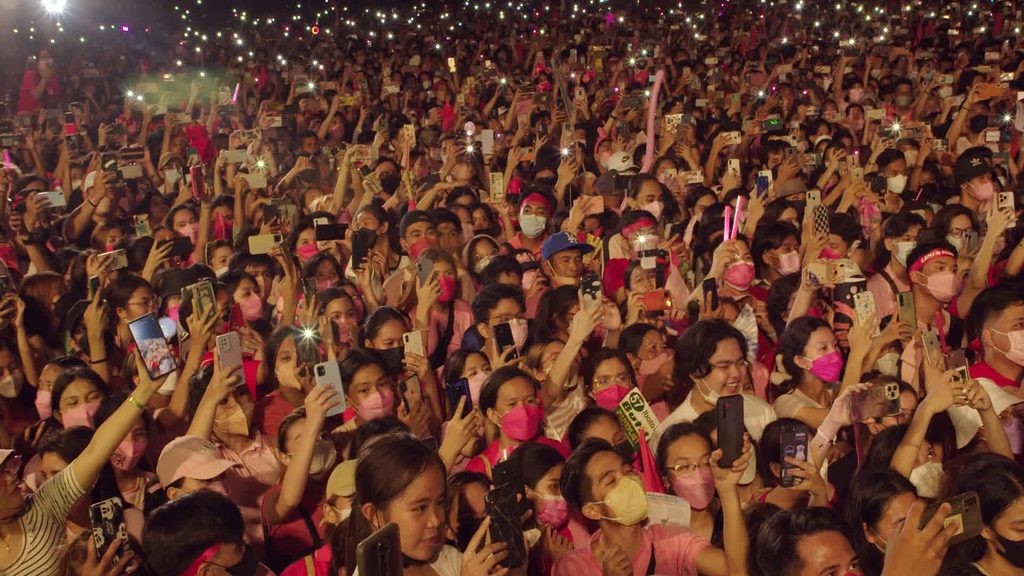
The numbers are staggering. Positivity, you buy into it. In spite of myself, I allowed myself to believe that she could pull it out.
Maria, what is the current state of journalism and journalist rights in the Philippines? How are fake news and social media manipulation being countered by media outlets like Rappler?
Maria: I think slowly what we’ve seen happen in countries like Russia started moving to democracies like the Philippines. What’s worrisome is that we voluntarily chill – this chilling effect – that we voluntarily lower accountability.
Investigative journalism – that’s what we’ve been fighting for. We need to continue to do that, especially under a new administration. State of journalism – fighting for freedom, I would say.
And since the Marcos administration took over, I would say the level of fear has slightly lifted. You can see that in the court decisions. Even the judges and the justices have been coming out with more court decisions.
The fact that Leila de Lima has now been granted bail and can walk out of nearly seven years in prison to fight her charges in court. That’s a good thing. The fact that of the 10 criminal charges that Rappler and I had, eight have now been thrown out and there are two left.
And the hardest part is making sure that we continue to fight corruption because that’s going to be critical. What can we do globally? This has been a lot of my focus for the last few years.
We need to demand greater accountability from the big tech platforms where you live in California. Social media has really corrupted the information ecosystem because of a surveillance capitalism model.
We need to stop the insidious manipulation. Generative AI is now changing everything. So that’s first. The second is how is news going to survive without money? So, we created the International Fund for Public Interest Media.
We raised $50 million last year and that is now being given out to news organizations, largely in the global sense.
And then the last part is we keep telling our people in every democracy that 2024 is a tipping point year, that we need to move people into the real world to actually be citizens before they vote.
Ramona, as a Filipino, how was it for you to witness Maria preparing for and accepting the Nobel Prize in 2021?
Ramona: I’m grateful that Maria gave me a front-seat role to observe this. It’s a once-in-a-lifetime privilege. It’s a proud moment.
You go through all the same emotions because they’re filming it. You go through all the disbelief and then the acceptance of it. It’s like I went through her own – I don’t know if she went through that process but I did.
I felt like, wait, teka muna, I didn’t get it. Why am I feeling this way? And the funny thing was that people on Facebook and IG were congratulating me. I’m like, why are you congratulating me?
Because of A Thousand Cuts. It was so weird. I’m like, thank you but I didn’t get the Nobel. I wish I did but the reality is thank you na lang but please congratulate Maria.
I had nothing to do with it. It was weird. It was strange but it was a privilege to observe it up close.
Ramona, can you give us any update on the Arnel Pineda and Journey feature film?
Ramona: So, Warner Brothers optioned the rights and they acted on the option. They triggered the option. We heard that Jon Chu is still interested and is still onboard to direct. And before the strike, it was his next project after Wicked.
But then he was in the middle of doing Wicked and then the strike happened. So, Wicked, I believe, as far as I know, has been delayed but Don’t Stop… is still on his docket.
I don’t know when, what year but it’s happening for sure. I mean, as sure as Hollywood can be sure. Warner Brothers did trigger their option already. So, I’m hoping it happens.
I think that would be really cool. We talked a lot about who will be Arnel, right? You and I. So, I would love to continue that conversation. Casting will be so fun. Although I have no power over it, it will still be fun to suggest.
And lastly, Ramona and Maria, what is your hope for the Philippines, this time from your personal perspective?
Ramona: I’m hopeful. The film is hopeful. I choose to be hopeful because without hope, really, you can’t move.
And the hope for me is the fact that we can all get together, community, collective energy to move forward. You know, it’s nice to hear.
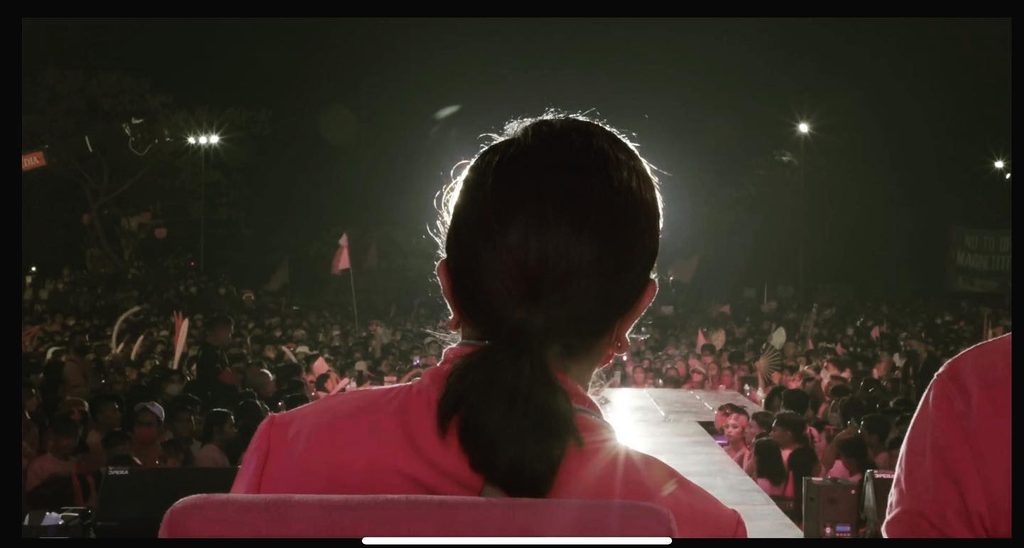
I don’t know really how that will become operative but I always have hope for the Philippines. It has to start from the top, though. People can’t be co-opted so easily.
That’s what I hope in the Philippines. How to do that? It will be a long road. And better education. I think better education is the key.
Maria: I know that this moment in time is pivotal, that everything we do matters now.
I’ve always said that 2024 is the year, the tipping point for both journalism and democracy. Part of that is because of all the elections happening.
But we already know that social media, that big tech enabled the rise of digital authoritarians, of populous leaders. This is part of what helped Duterte. Men like Duterte have pushed forward sexism and misogyny…
Our rights have been pushed back because of COVID bias. So, you know all the problems, Ruben. I talk about them forever.
The excitement comes from, we need to do something about it. So, what do we do? We’ve known the problem since 2016.
And one of the things, we rolled out a matrix protocol…now we’re in the process. It’s very nascent. We soft-rolled it out during Christmas so that our tech team can fix any problems because we’re not tech people.
But yet, leaving it in the hands of tech people has led us to this dystopia. So, we need to fix it. And I hope this is one of the ways we can do that. Hope for the Philippines. It’s very personal.
And let me say this. People get mad at me when I say that life is slightly better under the Marcos administration but it’s true.
And part of that is because it’s coming after a time when we have no idea how many people were killed in a very brutal drug war. Patricia (Evangelista) has documented this now in a critically acclaimed book (Some People Need Killing), with 80-plus pages of footnotes.
All of that gathering was under Rappler. The level of fear has lifted which then means it’s a bit more chaotic.
I hope that civil society, that Filipinos that do have power will go back to the values that made the Philippines.
I was invited to France for the 75th anniversary of the Universal Declaration of Human Rights. And I was in the room where they signed it.
And that was when I was told Carlos Romulo actually wrote parts. He was in conversation with Eleanor Roosevelt when they were writing the Universal Declaration of Human Rights.
We were there at the beginning and I hope that these values ride it out through here. So, I have hope. We have no choice but to hope. We’re working extremely hard to make it happen.
Thank you, Ramona and Maria. I hope next time we see you again in person. That’s the hope.
Maria: Yes! We missed you here! We’re coming to screen in Los Angeles, Ruben, so please, I hope you come and support.
– Rappler.com
Add a comment
How does this make you feel?
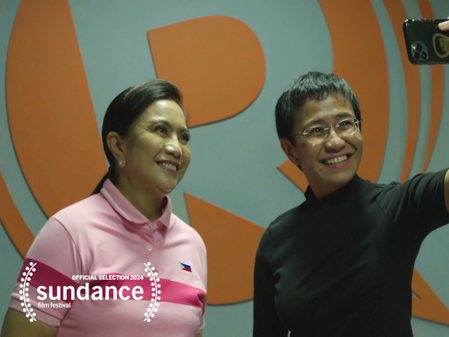




![[New School] Tama na kayo](https://www.rappler.com/tachyon/2024/02/new-school-tama-na-kayo-feb-6-2024.jpg?resize=257%2C257&crop=290px%2C0px%2C720px%2C720px)




There are no comments yet. Add your comment to start the conversation.